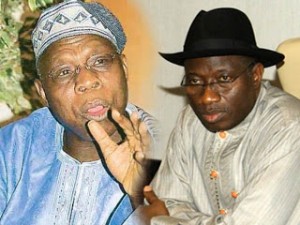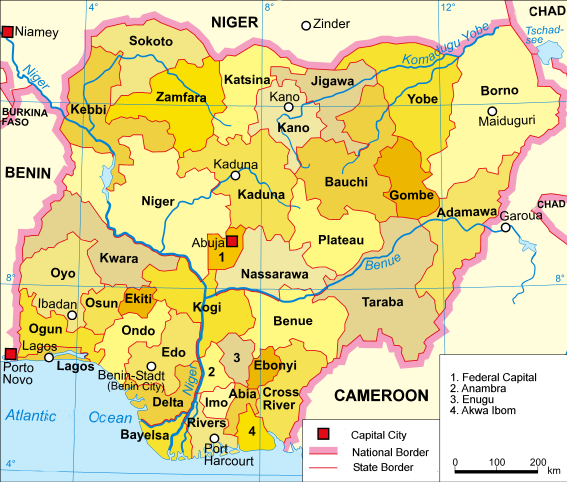 The Yoruba, like every group in Nigeria, has produced some of the most cerebral and visionary people the world has seen, and also some of the most bestial buffoons. Chief Obafemi Awolowo, the first premier of the Western region, a top ranked manager of men and resources and the first advocate of free education in Nigeria, represented the former while Olusegun Obasanjo, Nigeria’s only military and civilian leader, represented the latter.
The Yoruba, like every group in Nigeria, has produced some of the most cerebral and visionary people the world has seen, and also some of the most bestial buffoons. Chief Obafemi Awolowo, the first premier of the Western region, a top ranked manager of men and resources and the first advocate of free education in Nigeria, represented the former while Olusegun Obasanjo, Nigeria’s only military and civilian leader, represented the latter.
Paradoxically, Awolowo begged to serve Nigeria, but we rejected him, while we begged Obasanjo twice to rule Nigeria. This contradiction of rejecting our best candidates in favour of our very worst specimens probably best explains the dialectics of followership in Nigeria, and largely accounts for our current state of underdevelopment.
Like every pupil in public schools in Lagos, I was a beneficiary of Awolowo’s free education policy. Our parents paid nothing by way of school fees and we got all recommended books free of charge from the state government. Somehow, one didn’t bother to reflect on this privilege which we had come to see as a right. Politically, the vision of Awolowo could not, and was not allowed to take hold among Northerners because Awo had been painted as an irascible ‘ethnicist’. Nothing could change that perception.
It was not until much later, as researcher did I find out more about Awo’s philosophy and vision for Nigeria. And only then did I understand what most supporters of Awolowo saw: the best candidate for Nigeria from among his contemporaries against whom he stood for elections.
Apart from his free education policy which he introduced as far back as 1955, his views on a wide range of issues about Nigeria were years ahead of his contemporaries’. Indeed, if one changed the date of some of his submissions and published them today, they would fit seamlessly into the debates still going on about our nationhood. Except that they would be much better written and reasoned.
Today, I am convinced that if Awolowo had successfully sold his message to the northern masses, he would probably have received the same kind of support Gen. Muhammadu Buhari has. Surely, Awo’s free education policy would have produced at least two generations of well-educated northerners who would have freed the region from the greedy and wicked leaders it has today. Boko Haram probably wouldn’t have emerged.
It is now easy to understand what most people who knew Awo felt: Why couldn’t other people see their man as the person the nation needed? I sense that Buhari’s ardent supporters would probably be asking the same questions: Why can’t others see Buhari for who he really is, not what he has been depicted to be?
However, this piece is not about Buhari. I suspect that like Awo before him, we might have lost the chance of having a decent and stain-free visionary steer Nigeria to a land of equal opportunity for all – which is what happens when we allow politicians to define their opponents; it will always be negative. This piece is about our attitude of rejecting our best and picking our worst, then defending our poor choices blindly.
Except one is a member of President Goodluck Jonathan’s cabinet or a direct beneficiary of the ineptitude and corruption of his administration, then one accepts (even secretly) that by electing Jonathan in 2011, Nigeria not only chose the worst available option, but chose the most ill prepared and undeserving candidate to ever stand in elections at the presidential level.
Initially, Jonathan’s defenders said he was studying the situation. He ‘studied’ the situation from 2010 to 2011. After that, they said he didn’t want to rush policies so as not to reverse them later. The problem is that after nearly three years as acting and substantive president, we are yet to see a meaningful policy that even begins to address our most fundamental challenges as a nation.
Incidentally, while Jonathan was ‘studying’ the situation, a staggering N5 trillion ($31bn) was stolen. This is in addition to an average monthly borrowing of about N108bn (or N3.5bn every day for two years). President Jonathan’s thought process must be the most expensive in recorded history, though the outcome has only served to impoverish most Nigerians.
Unfortunately, even as the president has led Nigeria to growing foreign and domestic debt, rising unemployment, lack of security, decaying infrastructure and gross theft that prompted even a specimen like Obasanjo to lament that corruption under Jonathan was ‘too much’, it is clear that Jonathan and his Peoples Democratic Party (PDP) are preparing to ambush Nigerians once again in 2015.
If there is a single group that has brought Nigeria to its knees today, that group is the PDP. And as long as the Nigerian electorate allows itself to be deceived yet again by this group of politicians who have engaged a band of visionless youth in the media to insult and paint decent and visionary opposition leaders as religious, regional and racial jingoists, then the problems of Nigeria would only just be beginning.

